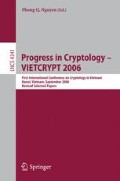Abstract
There is a rarely mentioned foundational problem involving collision-resistant hash-functions: common constructions are keyless, but formal definitions are keyed. The discrepancy stems from the fact that a function H : {0,1}* → {0,1}n always admits an efficient collision-finding algorithm, it’s just that us human beings might be unable to write the program down. We explain a simple way to sidestep this difficulty that avoids having to key our hash functions. The idea is to state theorems in a way that prescribes an explicitly-given reduction, normally a black-box one. We illustrate this approach using well-known examples involving digital signatures, pseudorandom functions, and the Merkle-Damgård construction.
Access this chapter
Tax calculation will be finalised at checkout
Purchases are for personal use only
Preview
Unable to display preview. Download preview PDF.
References
Bellare, M., Guerin, R., Rogaway, P.: XOR MACs: New methods for message authentication using finite pseudorandom functions. In: Coppersmith, D. (ed.) CRYPTO 1995. LNCS, vol. 963, pp. 15–28. Springer, Heidelberg (1995)
Bellare, M., Kilian, J., Rogaway, P.: The security of the cipher block chaining message authentication code. J. of Computer and System Sciences (JCSS) 61(3), 362–399 (2000)
Bellare, M., Rogaway, P.: Collision-resistant hashing: towards making UOWHFs practical. In: Kaliski Jr., B.S. (ed.) CRYPTO 1997. LNCS, vol. 1294, pp. 470–484. Springer, Heidelberg (1997)
Bellare, M., Rogaway, P.: Random oracles are practical: a paradigm for designing efficient protocols. In: First ACM Conference on Computer and Communications Security (CCS 1993), pp. 62–73. ACM Press, New York (1993)
Brown, D.: Generic groups, collision resistance, and ECDSA. Designs, Codes and Cryptography 35(1), 119–152 (2005)
Cipolla, C.: Le leggi fondamentali della stupidità (The fundamental laws of human stupidity). In: Allegro ma non troppo con Le leggi fondamentali della stupidità, Società editrice il Malino, Bologna (1988)
Damgård, I.: Collision free hash functions and public key signature schemes. In: Price, W.L., Chaum, D. (eds.) EUROCRYPT 1987. LNCS, vol. 304, pp. 203–216. Springer, Heidelberg (1988)
Damgård, I.: A design principle for hash functions. In: Brassard, G. (ed.) CRYPTO 1989. LNCS, vol. 435, pp. 416–427. Springer, Heidelberg (1990)
De Santis, A., Yung, M.: On the design of provably secure cryptographic hash functions. In: Damgård, I.B. (ed.) EUROCRYPT 1990. LNCS, vol. 473, pp. 412–431. Springer, Heidelberg (1991)
Devanbu, P., Gertz, M., Kwong, A., Martel, C., Nuckolls, G., Stubblebine, S.: Flexible authentication of XML documents. J. of Computer Security 12(6), 841–864 (2004)
Goldreich, O., Krawczyk, H.: On the composition of zero-knowledge proof systems. SIAM Journal on Computing 25(1), 169–192 (1997)
Goldreich, O., Oren, Y.: Definitions and properties of zero-knowledge proof systems. J. of Cryptology 7(1), 1–32 (1994)
Goldwasser, S., Micali, S.: Probabilistic encryption. J. Comput. Syst. Sci. (2), 270–299 (1984); Earlier version in STOC 1982
Goldwasser, S., Micali, S., Rackoff, C.: The knowledge complexity of interactive proof systems. SIAM Journal on Computing 18(1), 186–208 (1989)
Goldwasser, S., Micali, S., Rivest, R.: A digital signature scheme secure against adaptive chosen-message attacks. SIAM J. on Comp. 17, 281–308 (1988)
Halevi, S., Krawczyk, H.: Strengthening digital signatures by randomized hashing. In: Dwork, C. (ed.) CRYPTO 2006. LNCS, vol. 4117, pp. 41–59. Springer, Heidelberg (2006)
Merkle, R.: Method of providing digital signatures. US Patent #4,309,569 (1982)
Merkle, R.: One way hash functions and DES. In: Brassard, G. (ed.) CRYPTO 1989. LNCS, vol. 435, pp. 428–446. Springer, Heidelberg (1990)
Merkle, R.: Protocols for public key cryptosystems. In: Proceedings of the 1980 IEEE Symposium on Security and Privacy, pp. 122–134. IEEE Press, Los Alamitos (1980)
Matyas, S., Meyer, C., Oseas, J.: Generating strong one-way functions with cryptographic algorithm. IBM Tech. Disclosure Bulletin 27, 5658–5659 (1985)
National Institute of Standards and Technology. FIPS PUB 180-2, Secure Hash Standard (August 1, 2002)
Oren, Y.: On the cunning power of cheating verifiers: some observations about zero-knowledge proofs. In: 28th Annual Symposium on the Foundations of Computer Science (FOCS 1987), pp. 462–471. IEEE Computer Society Press, Los Alamitos (1987)
Rabin, M.: Digital signatures. In: DeMillo, R., Dobkin, D., Jones, A., Lipton, R. (eds.) Foundations of secure computation, pp. 155–168. Academic Press, London (1978)
Reingold, O., Trevisan, L., Vadhan, S.: Notions of reducibility between cryptographic primitives. In: Naor, M. (ed.) TCC 2004. LNCS, vol. 2951, pp. 1–20. Springer, Heidelberg (2004)
Rivest, R.: The MD4 message digest algorithm. In: Menezes, A., Vanstone, S.A. (eds.) CRYPTO 1990. LNCS, vol. 537, pp. 303–311. Springer, Heidelberg (1991)
Rogaway, P., Shrimpton, T.: Cryptographic hash-function basics: definitions, implications, and separations for preimage resistance, second-preimage resistance, and collision resistance. In: Roy, B., Meier, W. (eds.) FSE 2004. LNCS, vol. 3017, pp. 371–388. Springer, Heidelberg (2004)
Russell, A.: Necessary and sufficient conditions for collision-free hashing. J. of Cryptology 8(2), 87–99 (1995)
Wang, X., Lai, X., Feng, D., Chen, H., Yu, X.: Cryptanalysis of the hash functions MD4 and RIPEMD. In: Cramer, R. (ed.) EUROCRYPT 2005. LNCS, vol. 3494, pp. 1–18. Springer, Heidelberg (2005)
Wang, X., Yin, Y., Yu, H.: Finding Collisions in the Full SHA-1. In: Shoup, V. (ed.) CRYPTO 2005. LNCS, vol. 3621, pp. 17–36. Springer, Heidelberg (2005)
Winternitz, R.: A secure one-way hash function built from DES. In: Proceedings of the IEEE Symposium on Inf. Security and Privacy, pp. 88–90. IEEE Press, Los Alamitos (1984)
Author information
Authors and Affiliations
Editor information
Editors and Affiliations
Rights and permissions
Copyright information
© 2006 Springer-Verlag Berlin Heidelberg
About this paper
Cite this paper
Rogaway, P. (2006). Formalizing Human Ignorance. In: Nguyen, P.Q. (eds) Progress in Cryptology - VIETCRYPT 2006. VIETCRYPT 2006. Lecture Notes in Computer Science, vol 4341. Springer, Berlin, Heidelberg. https://doi.org/10.1007/11958239_14
Download citation
DOI: https://doi.org/10.1007/11958239_14
Publisher Name: Springer, Berlin, Heidelberg
Print ISBN: 978-3-540-68799-3
Online ISBN: 978-3-540-68800-6
eBook Packages: Computer ScienceComputer Science (R0)

